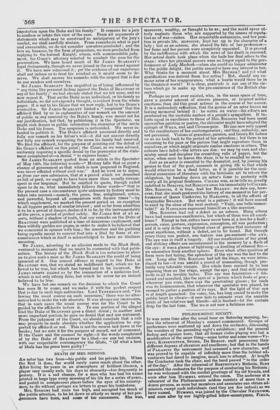DEATH OF MRS. SIDDONS.
AN actor has two lives—his public and his private life. When the first is done, the world rarely cares much about the other. After living for years in an atmosphere of brilliant illusion, a player very usually ends his days in obscurity—too frequently in penury. It is a sad change, for a man who has had his name printed in large type every morning of his life for a series of years, and pasted in conspicuous places before the eyes of his country- men, to die without perhaps six letters to grace his tombstone.
Mrs. &Doom had risen too high, and occupied too much of the public attention, to be let down so utterly, as many of her pre- decessors have been, and some of her successors. She was,
moreover, wealthy, or thought to be so; and the world never ut- terly neglects those who are supported by the sinews of reputa- tion as of war—riches. Her respectable connexions, and her posi- tion in private life, moreover, kept her up in the character of a lady ; but as an actress, she shared the fate of her profession—
her fame and her person were completely separated. It is proved by the indifference with which the news of her death is received. Her actual death took place when she bade her final adieu to the
stage : when her physical powers were no longer equal to the per- formance of Lady Macbeth—when she could no longer administer to the public delight, the public ceased to have any interest in her. Who thinks for a moment about' Mrs:BECHER? and yet what gratification was derived from her acting !. But, should any ru- mour arise of her reappearance, what a bustle would there be in the theatrical world ! It is clear, gratitude is not one of the vir- tues which go to make up the pre-eminence of the British cha- racter.
Perhaps no poet ever existed, who, in the .same space of time, gave a greater amount of sincere pleasure, or inspired nobler emotions, than did this great actress in the course of her career. It is a melancholy reflection, that the genius of an actor leaves no lasting memorial behind it : he writes on water7-his effects are produced on the unstable surface of a people's sympathies. If ta- lents equal in excellence to those of Mrs. SIDDONS had been spent upon either painting or poetry, the obituarist might have adopted the epitaph of WREN, and said Circumspice. He can now only appeal to the recollections of her contemporaries ; and they, unluckily, are not perennial. Visions of grandeur, passion, and beauty flit before us as we look back to the period of her splendour; but there is no recurring to the page or the picture that might reproduce them in ourselves, or which might originate similar emotions in others. The colours have faded—the letters are dim: we may by care and che- mistry unrol and decipher the crumbling rolls of papyri, but the actor, when once he leaves the stage, is to be rebelled no more.
Just as an actor is essential to the dramatist, and, by joining his genius to that of the poet, succeeds in giving life to that which would otherwise be a dead' letter, so it is possible for the acci- dental connexion of literature with the histrionic art to return the obligation, by handing down an actor's fame to posterity with nearly all its original freshness. CICHao was, as he tells us, greatly indebted to ROSCIUS, but Rosci us owes his immortality to C ICERO. Mrs. SIDDONS, it is true, had her BOADEN: we dare say, how- ever, that she much Preferred the history of one moment in her per- formance of Queen Catherine, by HARLOWE, to all the efforts of biographic BOADEN. Butwhat is a picture ? it will have ceased to exist by the close of the next century. "Voila, une belle immor- taliter as NAPOLEON expressed himself on a like occasion. Mrs. SIDDONS had not a defect as an actress. Many others have had numerous excellencies, but which of them was all excel- lence? Except in her; critics have never been at a loss for a fault : person, voice, gesture, expression, conception, all was perfection ; and it is only in the very highest class of genius that instances. of great excellence, without a defect, are to he found. But though every thing was perfect, one feature was pre-eminent—the EYE. The eye was in itself a tragedy. All our recollections of her great and striking effects are accompanied in the memory by a flash of the eye : it was a glance of lightning—a kindling of ethereal fire— an emanation from another sphere. Even when other qualities of form were fast failing, the splendour of the eye was the last to die out. Long after Mrs. SIDDONS had left the stage, we were intro- duced to her—it was amidst a crowd of unmeaning, though pro- bably very tolerable .visages. Her whole form seemed to be less imposing than on the stage, except the eye ; and that still shone forth in all its terrible lustre. This eye was fascination—it fol- lowed and searched, like the eyes of a picture which looks at you : wherever you were, there was the penetrating- glance ; for such was its luminousness,' that wherever the spectator was placed, he seemed to gather a portion of its rays. But the light of that eye is at length quenched : the voice, too, has long ceased" to make the public heart to vibrate—it now fails to animate even' the amiable circle Of her relatives and friends—all is hushed—let the curtain drop for the last time. The wo is not now a fictitious one.


























 Previous page
Previous page